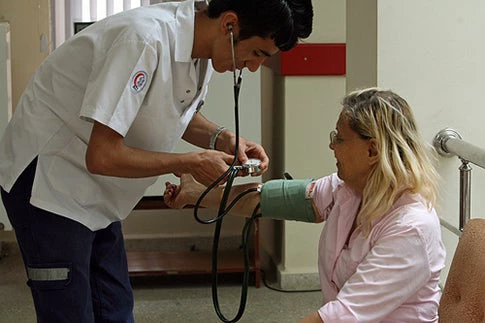A couple weeks ago, I had the opportunity to participate in the launching of The Lancet’s fourth series on non-communicable disease (NCDs) and development. This was a well-attended event chaired by the Dean of the London School of Hygiene and Tropical Medicine, Prof. Peter Piot.
It was clear by the presentations and discussion that there is a growing consensus at the international level on the need to identify mechanisms for global action to tackle NCDs. Indeed, as noted in a statement of support sent on behalf of U.K. Prime Minister David Cameron, “NCDs affect the poorest people most as prevention, detection and treatment services are often out of reach. Our focus on health in developing countries is to support improvement in the provision of accessible and good quality, basic health services for the poor so that countries can identify and address their own health priorities including NCDs."
The aim of the new series is to contribute to discussions on setting a clear path for countrywide implementation of NCD plans in the post-Millennium Development Goal (MDG) era, toward a unified goal of '25 by 25'—reducing NCD mortality worldwide by 2025. The series builds on previous Lancet Series (2010, 2007, 2005), and on the high-level United Nations NCD meeting convened in New York in September 2011.
The papers in the series cover a range of points of view, addressing: 1) the importance of embedding NCDs into post-2015 MDG strategy, essential if the '25 by 25' target is to be achieved; 2) NCD countrywide/ step-wise approaches including planning, implementation, accountability, and the importance of a National NCD Commission to monitor progress; 3) reducing health inequalities; 4) addressing the negative effects of 'unhealthy food and drink commodities'; and 5) the importance of scaling up access to vital medicines, including wider availability of affordable generic drugs.
Perhaps one of the key contributions of the new series to the ongoing discussion on “what to do” to effectively tackle NCDs is an article on how to improve responsiveness of health systems to NCDs while avoiding the false dichotomy of controlling communicable and non-communicable disease separately. Indeed, the Lancet article by Atun et al makes a strong case and provides examples on how the significant HIV and TB investments made over the last decade to strengthen health systems in developing countries offer opportunities to integrate NCD prevention and control with HIV and other programs.
As I’ve argued elsewhere in relation to the situation in Africa, the double burden of communicable and non-communicable disease challenges policymakers and service providers to adopt/adapt innovative approaches that use existing resources to make health systems more effective in dealing with the growing reality of individuals afflicted by multiple chronic conditions and complex symptoms. Let’s not forget, for example, that the scaling up of antiretroviral drug treatment has made HIV/AIDS a manageable chronic condition or that the comorbidity of TB and diabetes in the same individual can worsen outcomes for both diseases.
As we move into the post-2015 development agenda, building upon accumulated scientific evidence and country experiences, it is imperative that rather than concentrating on specific diseases, future global health efforts be centered around building institutions and systems that offer both more equitable access to quality services to address the health needs of the population, and financial protection in cases of premature death, ill health and disability.
This rethinking of goals and approaches is doable if we do not lose sight that the end result should be the improvement of health conditions that impede human development. Indeed, as Helen Clark, United Nations Development Programme Administrator, eloquently stated in the keynote address at the launch of The Lancet series, “NCDs, and the illnesses and suffering associated with them, stand in the way of people’s aspirations, freedoms, and capabilities to lead lives they value – that is, they stand in the way of realizing the core objective of human development.”
Follow the World Bank health team on Twitter: @wordbankhealth
Related
Blog: Sub-Saharan Africa: How can we avoid the disease silos trap?
Blog: “Ending the Communicable and Non-communicable Disease Divide in Africa”



Join the Conversation